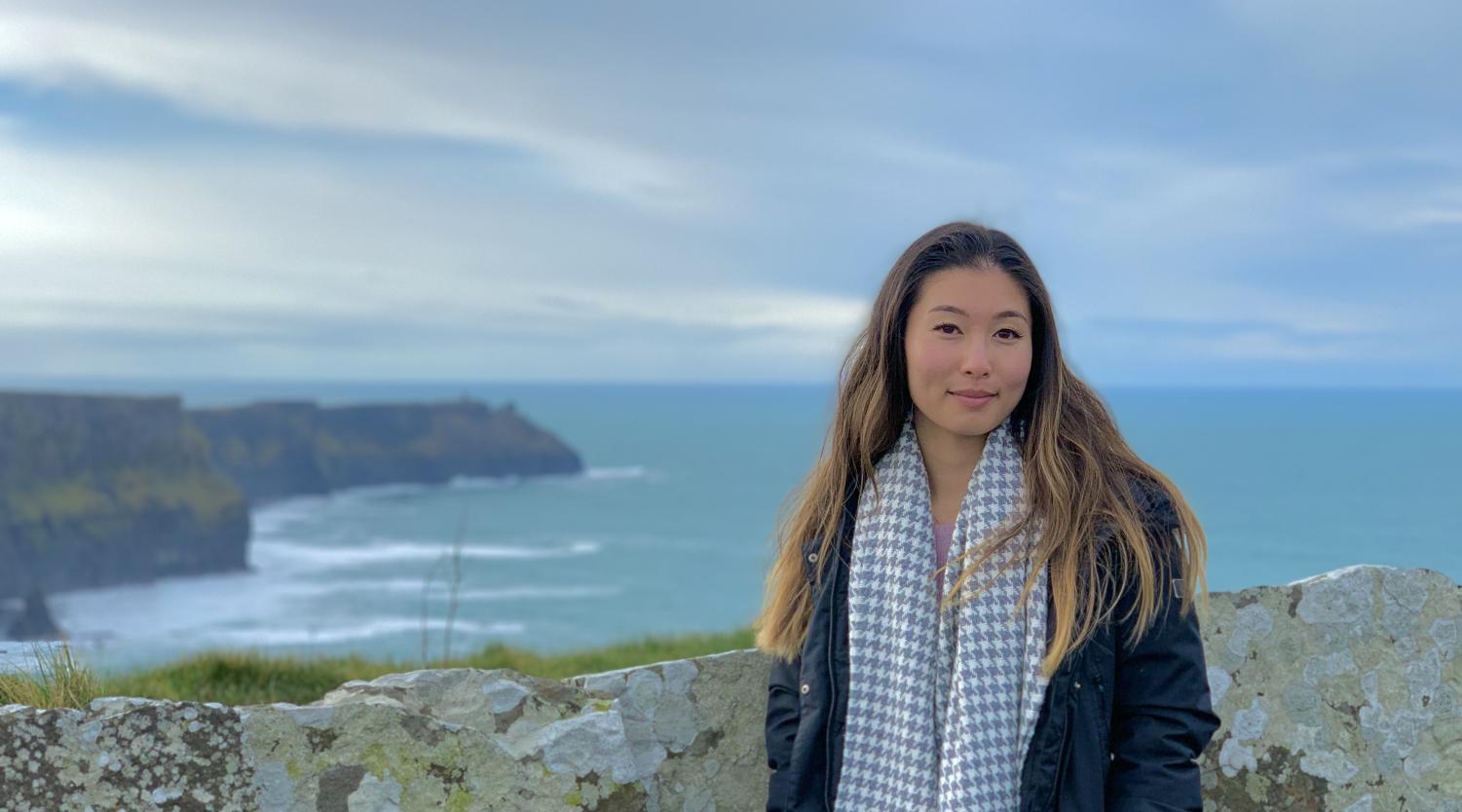UMass student recounts anti-Asian racism experienced during study abroad, pushes for change within organization
Lily Tang gained support from UMass community to hold the organization accountable
January 6, 2021
Lily Tang planned on studying in Shanghai, China for the Spring 2020 semester with CAPA Study Abroad, a Boston-based organization that runs study abroad programs for college students.
From initial departure materials for CAPA’s Shanghai program, Tang, a University of Massachusetts senior political science and BDIC major, said she noticed “a lack of cultural sensitivity,” adding that “there just was not a heavy emphasis on… the do’s and don’ts of going to a different country.” She cited little talk of racial justice or awareness of one’s identity between being an American and going to a country with a very different culture, such as China.
During the pre-departure phase of her study abroad, when Tang still intended to travel to Shanghai, she was matched with a fellow student in the same program through an initiative known as “CAPA Pals.”
“They send us their social media and stuff like that, and when I looked at their social media, I just got some red flags,” Tang said. “I felt that that student had a very orientalist view of China, just by their Instagram. So, I wasn’t really comfortable with being matched with this guy — who is a white guy — based off of that.”
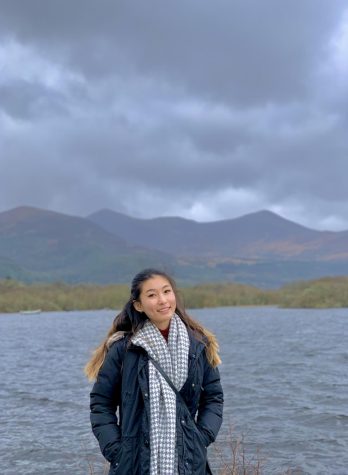
Tang emailed her program manager at CAPA, saying that she would not like to be matched with this individual. “I felt like this person just could have Asian fetish and I was not about to engage with that,” she said.
She said her suspicions seemed to have been proven correct when the individual was reassigned to her friend and roommate, who is also Asian-American, on the Shanghai program. Tang said the male student messaged her friend “slightly inappropriate comments… questioning her identity, questioning the stuff that she was doing.”
Due to the emergence of COVID-19 in China during the early months of 2020, UMass asked students planning to study there to find another country to travel to.
At what felt like the last minute, Tang was forced to change her travel plans and instead chose to go on CAPA’s Dublin program based out of Griffith College, along with another UMass student.
The UMass student who was Tang’s roommate in Dublin agreed to speak on the condition of anonymity. She verified Tang’s experiences and spoke of the discomfort and racism she also experienced.
At an after-school socializing event in Dublin, “people were just talking about COVID, kind of just treating it as a joke,” Tang said. Students shared memes and videos on Instagram about China and the coronavirus, including one that made fun of “[Chinese] people eating bats,” she said.
As coronavirus spread out of China and grew into a pandemic, so did a wave of anti-Asian racism.
Data from July generated by the Pew Research Center found that 58 percent of Asian-American adults indicated it is “more common for people to express racist or racially insensitive views about people who are Asian than it was before the coronavirus outbreak.”
According to the survey, Asian-Americans are “more likely than any other group” to have been subject to jokes or slurs due to their ethnicity or race since COVID-19 emerged at 31 percent, with 26 percent saying they feared threats or physical assault by others since the pandemic began.
Tang explained that she and her roommate, the only two Asian-Americans in the program, were in the room while the other students, who were mostly white, “just felt comfortable enough to say all those things and kind of make fun of the situation even though our presence was there.”
“And even though I pushed back at all those things, they still ignored me, and time just, like, laughed it off,” Tang said.
Tang explained why she felt these comments were racist, saying, “It’s like when people always want to joke about China and be like, ‘Oh, they’re so backward. It’s such a communist country.’ Like that type of mentality. But then on top of that, it’s like, ‘Oh, now Chinese people eat bats and that’s why we have COVID.’”
Tang added that Americans, particularly white Americans, will lump people of different Asian ethnicities together as if to suggest that, “everybody’s Chinese.”
Tang’s roommate agreed and said that when the pandemic hit, CAPA did not reach out to them enough to check in.
Tang said CAPA staff should have been aware of a rise in anti-Asian racism during the early phases of COVID-19 and wondered why she never received a statement or why staff never led an open discussion about COVID-19 and the misunderstanding surrounding the virus, despite early evidence disputing the belief that bats, consumed by humans, were the cause of the virus.
“We went abroad in a time where there was a lot of things happening between the U.S. and other countries,” Tang said. “I think that kind of goes back to like, what is the point of a study abroad program if it’s not to educate students on the interconnectedness of all these issues?”
When asked if they have addressed anti-Asian racism in the face of COVID-19, Darin Smith-Gaddis, the director of institutional relations and diversity initiatives for CAPA, said the organization had published articles about anti-racism, had training regarding the issue with staff and began reviewing their policies.
“Starting earlier this summer, we began a comprehensive review of our student-facing code of conduct, in-country program orientation and staff facing policies around student support, including racism and anti-bias,” Smith-Gaddis said in an email.
Throughout their time in the program, both Tang and her roommate said they had continuing issues with the student they thought to have an “Asian fetish.” Tang’s roommate spoke about one night when he asked her to leave with him to get something from his room. When she refused, the student proceeded to physically pick her up by her sweatshirt and told her he was going to make her go.
“I’ve never been in a situation like that before. So even though it made me super uncomfortable, I didn’t really realize what was going on,” the roommate said. “I’m happy that my subconscious was smart enough to urge me to go and invite somebody over, because that’s when I did.
“I remember that night, having a dream that I was raped by him—and that was a dream,” the roommate said. “But it showed me a little bit more about how traumatized I was by that. I remember the whole situation and process of trying to even just, like, keep my distance from him after that was super difficult.”
The roommate said she never felt comfortable disclosing what happened with the CAPA staff.
“There was never anything there to make me feel like I could, even though they were really nice people,” she said.
The roommate also cited several incidents of microaggressions. For example, when one student, who was also supposed to study in Shanghai, was told about the large crowds in certain parts of China, he said, “it’s not like I liked my personal space,” which the roommate found to be culturally insensitive.
“We take all allegations among our students and staff very seriously,” CAPA said in a statement. The statement also said they “thoroughly investigate each situation and act accordingly to address each situation appropriately with care, concern, and compassion. Students are encouraged to report all incidents and forms of racism as the health and safety of our students is of paramount importance.”
When the students were sent home early because of the pandemic the roommate said she believes herself and Lily “were lucky that we were only there for a month and a half.”
Social Media and Email Outreach
Rachael Chen, a junior music major and a friend of Tang, said she believes UMass should end its affiliation with CAPA because of the students’ experiences.
“UMass is always like, ‘You matter at UMass,’ or something about diversity,” Chen said. “And it’s just very ironic to be affiliated with an organization that says they care about diversity, but they don’t actually take any action, any real effective action.”
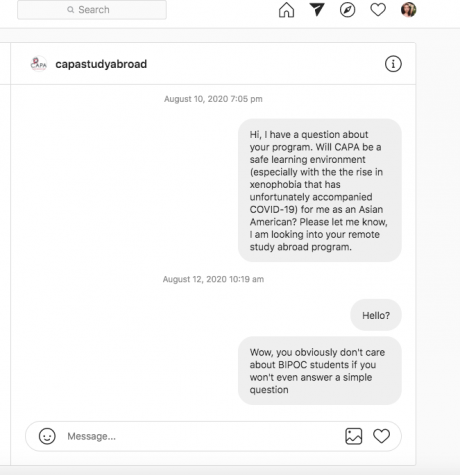
Tang reached out to different group chats and on social media to spread awareness about her experiences. After hearing about Tang’s experience, Chen reached out to CAPA via email and asked them if they would ensure her safety as a person of color. She also brought up concerns about anti-Asian racism due to COVID-19, mentioning how people have called it “the China virus” and made jokes about eating bats.
According to Chen, CAPA never responded to her email.
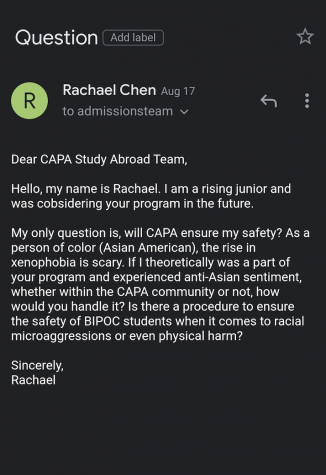
“I would just hate to be a part of a community that doesn’t care about me,” Chen said. “It definitely makes me not want to, if I want to study abroad, not use this organization.”
Junior biology major Malina Nguyen follows Tang on Instagram and originally heard about Tang’s complaints from her posts on the social media site.
“Honestly, it just made me really angry, because it just sounded like they were deflecting everything she was saying. It was a lot of gaslighting of her experience and they wouldn’t even address that racism was happening,” Nguyen said. “But Lily [said] it’s racism.”
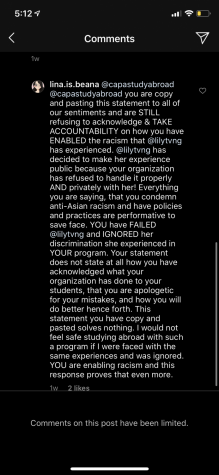
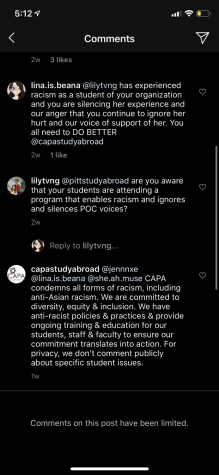
On multiple posts, Nguyen commented: “@lilytvng has experienced racism as a student of your organization and you are silencing her experience and our anger that you continue to ignore her hurt and our voice of support of her. You all need to DO BETTER @capastudyabroad.”
According to Nguyen, CAPA wrote a similar message responding to multiple people. “So, it just felt like they were ignoring our voices when they were responding to so many of us. They weren’t even addressing what was happening.”
“Sharing our experiences with racism is traumatizing. Speaking about it and putting all of this on us to make sure that a program is safe, it’s not our job,” Nguyen said.
Jennie Chang, a sophomore social thought and political economy and legal studies major, and current vice president of the SGA, also supported Tang with comments on some of CAPA’s Instagram posts.
According to Chang and Nguyen, after students started commenting, CAPA began deleting their comments and turning off the ability to comment on the posts. Both Chang and Chen expressed concerns about CAPA turning off their comments.
In response, Chang rewrote her comments on other posts. She told the Daily Collegian that she was confused why CAPA didn’t answer because “no one was asking a hard question. I feel like everyone who was commenting was just like, ‘Can you please answer Lily?’ Like, please just do something, have an answer.”



CAPA posted a statement on its Instagram on Aug. 20 which read in part: “CAPA is committed to using diversity, equity, and inclusion [DEI] as a lens in all aspects of our work… We condemn racism and are actively engaged in dismantling structural bias within our organization and supporting similar initiatives with our partners and within the international education field.”
The statement was not posted on their Twitter, Facebook or Linkedin.
In response to claims of turning off the comments, “we changed the settings for comments — we did not turn them off,” Smith-Gaddis said. “We deemed this change necessary following multiple violations of our terms of use, including defamatory comments from people with no direct connection to CAPA.”
“And even on that statement about commitment to anti-racism, you can’t even write a comment. So, it completely closes the opportunity to have a discussion which is so important for anti-racism,” Chen said.
Both Nguyen and Chen said that Tang’s experience gave them concern about their own study abroad plans.
“I’m not trying to give my money to a program that’s not going to hold themselves accountable when in face of racist incidents,” Chen said.
Tang expressed frustration that students felt as though they had to contact CAPA through email and on social media.
“What does that say about their actual commitment to this work? Even though they got an award, even though that they put out a statement about Black Lives Matter, you know,” Tang said. “Is it just because they want to make sure that the people on Instagram stop being mad at them? I think those are just avoidance tactics that they’re doing, and I think they’re at this point, just trying to do damage control and not really standing by their statements.”
Tang expressed that she felt “ignored” and that CAPA didn’t recognize how hard it was for her, as a student of color, to come forward.
Moving Forward
Tang sent a list of demands she would like to see adopted by CAPA going forward, which included live and interactive diversity training, even if virtual. Tang said she benefited from such live training for a program she did in Guatemala during which participants could interact with a facilitator and “have genuine conversations” and “explicitly talked about positionality and talked about how our statuses change when we go to different countries.”
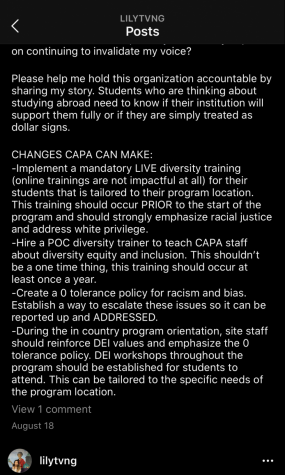
Tang stressed she wants the organization to enact a zero-tolerance policy toward racist incidents that are in violation of CAPA’s Code of Conduct. She also wants to see more structural procedures in place to address students’ issues and concerns, such as informing students on the first day about how to report an issue.
Diversity and inclusion workshops throughout the study abroad, as well as the reinforcement by staff members of these values during the program orientations, would help the issue, Tang said.
Tang said she wished CAPA had addressed her concerns earlier on and would say that they would re-examine their policies and curriculum.
Tang’s roommate said that CAPA should have hosted a pre-departure class with diversity and inclusion training and cited what she saw as a lack of cultural sensitivity training in the beginning of the program as one of the reasons she didn’t feel comfortable going to the staff.
Tang agreed, saying that CAPA lacked pre-departure resources and did not help American students unpack biases and self-reflect going into a study abroad.
“As a result, each student of color — in this case, Asian-American students — had to be put in positions where it’s slightly uncomfortable,” Tang added.
When asked if CAPA gave diversity and inclusion training to students before the program and what specifics were taught, a spokesperson for the organization said their work is ongoing, but currently the organization is “developing updated student modules on DEI and incorporating them into our student orientation.”
The new modules emphasize the organization’s diversity and inclusion values, according to a spokesperson, and hold students and staff accountable. The modules also include “country-specific nuances.”
While Tang acknowledged that CAPA could not necessarily prevent incidents and individuals’ actions such as this, she felt as though the organization has “a responsibility [with] educating students from the get-go.”
When the Daily Collegian asked CAPA for comment on Tang’s experience in the program, a spokesperson cited FERPA regulations, refusing to discuss “individual student issues… as it violates federal law and the students’ rights to privacy.”
The International Programs Office at UMass has “been engaged in a longstanding and successful partnership with CAPA that goes back more than 20 years,” said Mark Eckman, director of education abroad, in an email. “Hundreds of UMass students have had a positive experience with CAPA programs, and the organization is a charter member of one of our key professional organizations – Diversity Abroad.”
According to Eckman, IPO was first informed about Tang’s experience from CAPA after the program concluded.
“Supporting students studying abroad is a critically important aspect of IPO’s role and is an essential part [of] our everyday work,” he said. “In seeking to follow up and address the student’s concerns, we have sought to arrange a joint meeting with her, CAPA and IPO. Unfortunately, to date we have been unsuccessful in having the student accept offers to have her participate in a joint discussion.”
Eckman said that IPO has met with CAPA staff on several occasions to discuss Tang’s experience, “to determine the best ways in which both organizations can support this student, and also learn from the ways in which the student did not feel supported. We are confident that CAPA has taken the feedback provided by the student extremely seriously and the organization is making proactive changes.”
Eckman said they “believe CAPA will incorporate improvements into its program as it evaluates this matter, and we will continue to monitor the issue.”
Tang said she thought that she was only meeting with IPO employees and was not aware that IPO was scheduling a joint meeting with CAPA. Tang added that she was given three times that conflicted with her class schedule. The Daily Collegian viewed the emails, which did not state that CAPA would be attending the meeting.
Tang said she “didn’t want to waste more of [her] time” after CCing IPO in her correspondence via email with CAPA.
“They never reached back out to see if the situation was resolved so I took that as them not wanting to deal with this issue anymore,” Tang said. “If that’s not the case, I would welcome them following up with me.”
Tang said she is still unsure if IPO has spoken with CAPA and devised an anti-racism plan going forward.
“Since it has been over a semester, I would be really disappointed to see that there’s a lack of action when I have documented all my [concerns] very clearly to both IPO and CAPA,” Tang said. “They didn’t need me to reiterate the same story when it’s on paper and I even came up with action steps I wanted to see happen as an alumnus of the abroad program.”
Tang said that much of the onus lies with CAPA to make changes to their programs and curriculum, not necessarily IPO.
In their statement, a CAPA spokesperson wrote, “Our work in this area is ongoing and continues to advance. DEI work requires continual iteration in step with up-to-date best practices.”
The spokesperson provided a similar message to the organization’s original statement about anti-racist work, which was mentioned earlier in this article. CAPA is currently developing updated student modules on DEI and incorporating them into our student orientation, the spokesperson said.
CAPA outwardly prides itself on values of diversity and inclusion, having received an award on these merits, but Tang said her personal experiences with CAPA diverged from this image.
“If they are saying all these [things about diversity and inclusion] on their website, I think it’s even more important that they exemplify it in the classroom and through their programs. And that’s where I’m seeing a failing of it,” Tang said.
In their statement, CAPA said its organization “continually assesses and iterates our DEI policies and procedures. DEI work must be thoughtful, deliberate, and openly articulated. We expect and support our peer organizations, institutional partners, and our program participants in evaluating our DEI commitments, progress, and outcomes and hold us accountable.”
In response to the issues brought up by Tang, CAPA said that it has identified various areas which need work including, increased training for faculty and staff specifically on issues of racism and anti-bias, completed a revision of the “student pre-departure resources and in-country orientation to include more comprehensive training on diversity and inclusion/creating a safe and inclusive on-program experience for students from diverse backgrounds, in addition to a review of the CAPA Code of Conduct.”
The organization will also add additional mechanisms for students to report issues and a more “comprehensive approach to DEI curricular, co-curricular, and extra-curricular programming for the CAPA community.”
Tang added that while she can’t change what CAPA does, she wants to raise awareness about her experience.
“It’s important for this to be documented so that other students, you know, researching study abroad programs can know exactly what they’re going into and make sure that like, they’re adding this as another factor into their decision for going on different programs,” Tang said.
Cassie McGrath can be reached at [email protected] and followed on Twitter @cassiemcgrath_. Chris McLaughlin can be reached at [email protected] and followed on Twitter @ChrisMcLJournal.
